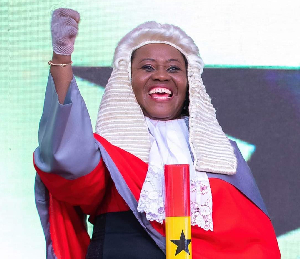The Chief Justice, Gertrude Torkornoo, has called for broader efforts to embed Alternative Dispute Resolution (ADR) practices, particularly mediation, into the legal system to fully leverage its potential.
“This includes integrating mediation within our legal frameworks, training legal professionals and informing the public on mediation’s benefits,” Justice Torkornoo stated during remarks delivered on her behalf at the launch of the Mediation Bridge initiative in Accra.
She emphasised that collaboration between the judiciary, legal practitioners and community organisations is crucial for raising awareness and improving access to mediation services. “By fostering partnerships, we can ensure that mediation becomes a standard feature of dispute resolution,” she noted.
Justice Torkornoo described mediation as a key pillar of a balanced and responsive justice system. “Let us continue to promote mediation and create a more resilient, inclusive justice system for all,” she added.
The Chief Justice noted that by encouraging parties to resolve their disputes outside of court, mediation helps reduce the number of cases requiring judicial intervention. “This not only frees up valuable court resources but also allows judges to focus on more complex cases that necessitate their expertise,” she stated.
Furthermore, she mentioned that mediation outcomes are often more satisfying for the parties involved, as they have a hand in shaping the resolution. This, she said, leads to higher compliance rates and fewer subsequent disputes.
According to Justice Torkornoo, since the passage of Ghana’s Alternative Dispute Resolution Act 2010 (Act 798), ADR has offered an official framework for mediation, arbitration and customary arbitration alongside an ADR Centre.
She noted that statistics from Herbert Smith Free Hills showed that between 2007 and 2011, 55 percent of 16,080 recorded cases in District and Circuit Courts were settled through mediation.
Justice Torkornoo observed that recent statistics show encouraging improvements, commending the Mediation Bridge initiative for further offering to advance these efforts.
She added that Ghanaian courts already utilise court-connected ADR as a standard approach to enforce the ADR Act. Additionally, High Court Order 58 under the Civil Procedure Rules, 2004 (C.I. 47) provides for pre-trial settlement conferences aimed at reducing court congestion and expediting dispute resolution.
“Every individual deserves fair and timely resolution of their disputes,” Justice Torkornoo said, calling for a continued commitment to expanding ADR as a vital part of a balanced and responsive justice system.
The president of The Mediation Bridge, Chris Essilfie, also speaking at the ceremony, noted: “The establishment of this institution highlights our firm commitment to offering a platform where disagreements can be settled amicably and fairly”.
He asserted that in a time when the judicial system faces a backlog of cases, effective mediation helps ease this burden and creates a path for parties to continue their business relationships even after disputes are resolved.Business opportunities
“For us, mediation is more than just a process; it reflects our belief in the transformative power of communication and mutual respect. Mediation offers individuals, businesses and communities a chance to be heard, respected and empowered to shape their outcomes.
“This is especially crucial in our business sector, where trust and collaboration are the bedrock of successful partnerships and long-term relationships,” he stated.
He announced that The Mediation Bridge will begin offering free training sessions on mediation for interested stakeholders.
Also, the president of the Central Regional House of Chiefs, in a speech on his behalf, underscored traditional leaders’ commitment to mediation, advocating for the inclusion of indigenous dispute resolution practices in modern frameworks.
“We can empower leaders and communities to navigate challenges with empathy and respect, blending our traditions with contemporary values,” he stated.
Business News of Wednesday, 13 November 2024
Source: thebftonline.com
Chief Justice urges greater integration of mediation into legal system
Entertainment












